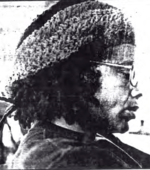 The Boston Phoenix Frank “Parky” Grace, 29, was accused of being the triggerman in the murder of Marvin Morgan, 19, in New Bedford, Massachusetts, on August 8, 1972. On that evening, Marvin Morgan had just left a tavern, the West End Social Club, with his cousin, Eric Baker, 19, a five-bag-a-day heroin addict, and Jasper Lassiter, a close friend of Morgan and Baker from Providence, Rhode Island. The three were in New Bedford to make a dope deal at a house down the street. Several men, including Ross Grace, 20, Parky’s younger brother, confronted Morgan, Baker and Lassiter on the street. There was an argument, followed by gunfire, during which Morgan was shot dead. Donald “Dolomite” Arnum and Phillip “Juggy” Glover were also involved in the confrontation. Baker had told police he thought the shooter “had a funny nickname.” “Could it have been Parky?” they asked, and Baker said it could have been. Then they went looking for Frank “Parky” Grace). The New Bedford authorities presented the argument that Parky Grace was the man who fired two shots over the shoulder of his brother, who also held a pistol. At trial, Baker and Lassiter said Parky was the shooter. Parky said he wasn’t even at the scene, and he had alibi witnesses who placed him at other sites during the night of the crime. Ross Grace also denied being at the scene. In January 1974, an all-white jury convicted Parky, who was African-American, of first-degree murder, and Ross Grace, also African-American, of second-degree murder. Both got life sentences, but Parky’s was without parole. The judge directed verdicts of acquittal for Arnum and Glover. The shooting and trial came at a time of great tension between the police and the African-American community of New Bedford. The neighborhood was home to a highly active branch of the Black Panther party, and Parky Grace was its leader. He had joined the army in 1964 and served a year in Vietnam, where he turned against the war. Honorably discharged, he participated in anti-war and civil rights rallies, engaging in the inflammatory anti-establishment rhetoric of the time, and started free programs for food, clothing and medicine. In the years leading up to the Morgan shooting, Parky Grace was arrested 30 times for his activities, but never convicted of a felony. He and his supporters charged his arrest was political, an excuse to get him off the streets of New Bedford and out of the authorities’ hair forever. Parky Grace lost several appeals and spent ten years in jail before obtaining a hearing on a motion for a new trial in 1984. Over a six-day period, 20 witnesses spoke on his behalf, among the most important being Ross Grace, who said he was the only person firing a gun and that his brother was not there. His motivation, he said, was revenge. On June 20, 1972, seven weeks before the murder, he said Marvin Morgan had snatched him off the streets, roughed him up, and taken $800 from him. “I got away and I was after him,” he testified. Ross Grace had reported the incident to police and they had investigated and found the car’s owner had been Roland Morgan of Providence, Rhode Island. Ross said he told his original lawyers he was the shooter, but they had advised him to remain silent. Those two lawyers signed affidavits confirming Ross's story. Ross said he, with his brother's approval, had not confessed because he thought Parky would be acquitted – since he was innocent and had witnesses to prove it – and maybe he’d get off, too. Another witness, Ronald Cruz, who lived in an apartment overlooking the shooting scene, said he had known the Grace brothers all his life, that he had looked out his window upon hearing a commotion, had seen Ross Grace holding a pistol, and heard two shots. He said Parky Grace was not there. He, like Ross Grace, said he had not come forward at the time of the trial because he assumed Parky would be found innocent and maybe both brothers could beat the rap. Jasper Lassiter changed his testimony from the trial. He said the cops pressured him to identify Parky as the shooter, but it was really Ross, and he never saw Parky until he picked him out at the trial after a police detective told him Parky would be the guy sitting next to Ross at the defense table. Another new eyewitness said he was on the street at the time and saw Ross Grace with a gun in his hand before the shooting, and he did not see Parky there. He said he told his story to the police, but they said they had enough witnesses, and they never contacted him again In January 1985, New Bedford Superior Court Judge Elizabeth Dolan, citing new evidence presented by the defense, ordered a new trial for Frank Grace, and he was freed on $3,000 bond. Grace survived an appeal by the state, and while the Bristol County District Attorney’s Office insisted for a long time that it was considering re-trying him, the charges were dismissed in 1988. Frank Grace moved to Boston and was active in prison reform activities until he died from an illness in 2001 at the age of 56. - Jim Tuohy
|